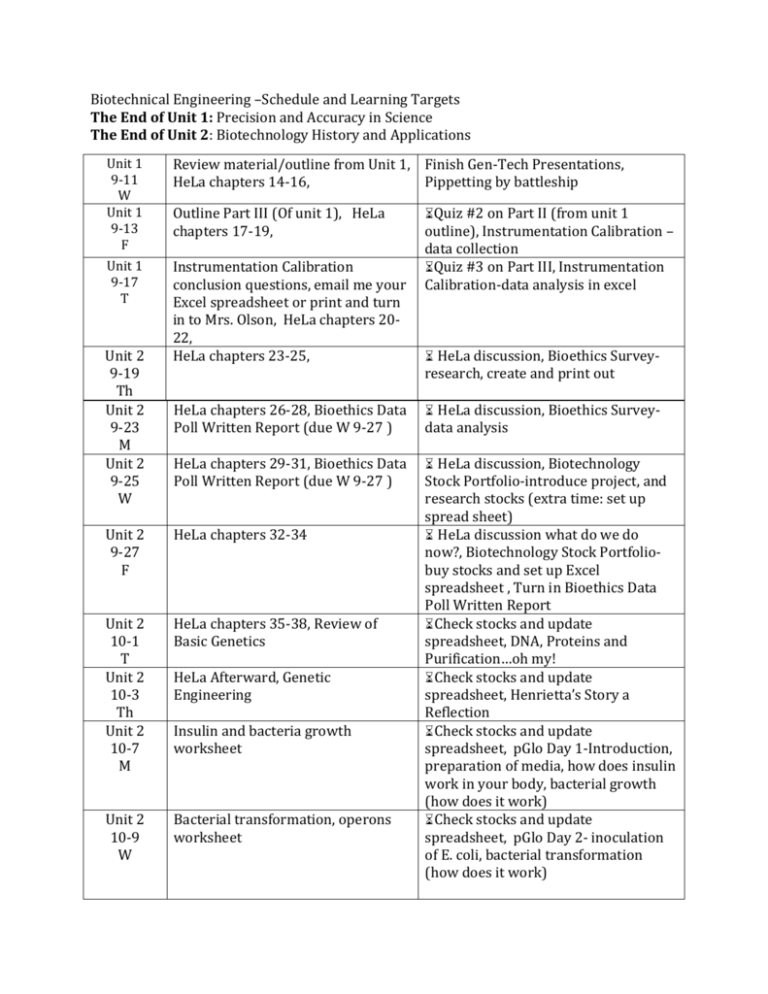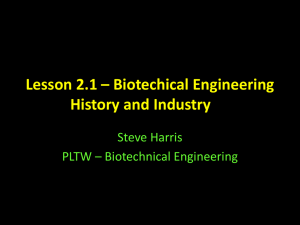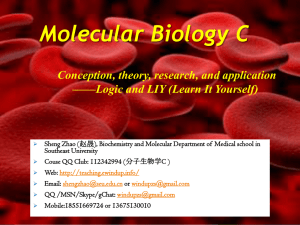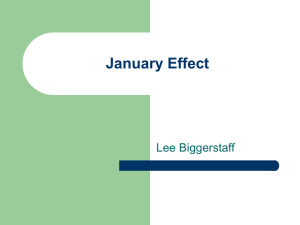Biotechnical Engineering –Schedule and Learning Targets The End
advertisement

Biotechnical Engineering –Schedule and Learning Targets The End of Unit 1: Precision and Accuracy in Science The End of Unit 2: Biotechnology History and Applications Unit 1 9-11 W Unit 1 9-13 F Review material/outline from Unit 1, Finish Gen-Tech Presentations, HeLa chapters 14-16, Pippetting by battleship Unit 1 9-17 T Instrumentation Calibration conclusion questions, email me your Excel spreadsheet or print and turn in to Mrs. Olson, HeLa chapters 2022, HeLa chapters 23-25, Unit 2 9-19 Th Unit 2 9-23 M Unit 2 9-25 W Outline Part III (Of unit 1), HeLa chapters 17-19, ⌛Quiz #2 on Part II (from unit 1 outline), Instrumentation Calibration – data collection ⌛Quiz #3 on Part III, Instrumentation Calibration-data analysis in excel ⌛ HeLa discussion, Bioethics Surveyresearch, create and print out HeLa chapters 26-28, Bioethics Data Poll Written Report (due W 9-27 ) ⌛ HeLa discussion, Bioethics Surveydata analysis HeLa chapters 29-31, Bioethics Data Poll Written Report (due W 9-27 ) ⌛ HeLa discussion, Biotechnology Stock Portfolio-introduce project, and research stocks (extra time: set up spread sheet) ⌛ HeLa discussion what do we do now?, Biotechnology Stock Portfoliobuy stocks and set up Excel spreadsheet , Turn in Bioethics Data Poll Written Report ⌛Check stocks and update spreadsheet, DNA, Proteins and Purification…oh my! ⌛Check stocks and update spreadsheet, Henrietta’s Story a Reflection ⌛Check stocks and update spreadsheet, pGlo Day 1-Introduction, preparation of media, how does insulin work in your body, bacterial growth (how does it work) ⌛Check stocks and update spreadsheet, pGlo Day 2- inoculation of E. coli, bacterial transformation (how does it work) Unit 2 9-27 F HeLa chapters 32-34 Unit 2 10-1 T Unit 2 10-3 Th Unit 2 10-7 M HeLa chapters 35-38, Review of Basic Genetics Unit 2 10-9 W Bacterial transformation, operons worksheet HeLa Afterward, Genetic Engineering Insulin and bacteria growth worksheet Unit 2 10-11 F Other operons? Bacterial transformation examples Unit 2 10-15 T Transformation efficiency examples, protein basics Unit 2 10-17 Th What’s happening in the tube (protein purification) part 1 Unit 2 10-21 M What’s happening in the tube (protein purification) part 2 Unit 2 10-23 W Unit 2 10-25 F ⌛Check stocks and update spreadsheet, pGlo Day 3transformation, bacterial transformation (what do we expect), Protein Purification- media preparation, Designer GenesIntroduction ⌛ Check stocks and update spreadsheet, pGlo- Day 4observations, transformation efficiency, Protein Purificationinoculation & analysis of bacteria for scale up ⌛ Check stocks and update spreadsheet, Protein Purificationseparation part 1, Designer Genesthumbnail sketches & plasmid map (group work time) ⌛Check stocks and update spreadsheet, Protein Purificationseparation part 2, Designer Genes(group work time) ⌛Check stocks and update spreadsheet, Designer Genespresentations ⌛Designer Genes-presentations (if additional day is needed) Vocabulary – Biomedical Engineering Biotechnical Engineering Genetic Engineering Industry Time Line Trade-offs Molecular biology Bioremediation Recombinant DNA technology Clinical Medicine Biopharmaceutical Environmental Remediation Pet industry (genetics) Insurance (genetics) Bioluminescence Bioprocessing Lactose Operon Protein RNA Trait araC regulator protein Engineering Gene Market Stock Portfolio Bioethics Gene splicing Genetic engineering Ergonomics Milestone Gene Technology Military (genetics) Law (genetics) Agriculture (genetics) Amino acid Bioinformatics Bioreactor Plasmid Transformation DNA Beta lactamase GFP Concepts & Review – A. Biotechnology History and Applications 1. Conduct a Biotechnology Timeline WebQuest to gather information about the evolution of the field of biotechnical engineering. 2. Develop a scaled timeline illustrating major biotechnical engineering milestones. 3. Assess the impact of each milestone based on your research. 4. Identify the fundamental concepts common to all major industries in biotechnical engineering. 5. Identify and explain how biotechnical engineered products impact society. 6. Predict future developments in biotechnical engineering. 7. Investigate and begin to develop an understanding of the relationship between financial markets and scientific research. 8. Research, create and manage a stock portfolio. 9. Use Excel to create graphs of your data. 10. Use your graphs and data to produce evidence. Accurately use evidence to support or refute claims. 11. Apply your practical knowledge of genetic engineering to the design of a novel and beneficial application of the reporter gene, green fluorescent protein. 12. Determine the proper techniques for isolating proteins and bacterial transformation. 13. Know the methods that can be used to determine if transformation was successful. 14. Identify the environmental conditions, both physical and biological, that must be considered during the scale up of an organism for bioprocessing. B. Bioethics 1. Discuss the differences between values, morals and ethics. 2. Describe the variables that shape one’s ethics. 3. Role-play a bioethics case study to address and personalize the different perspectives involved. 4. Analyze the bioethical issues that arise when various technological advancements create new options. 5. Create and test a public opinion survey on the bioethics of biotechnology.






